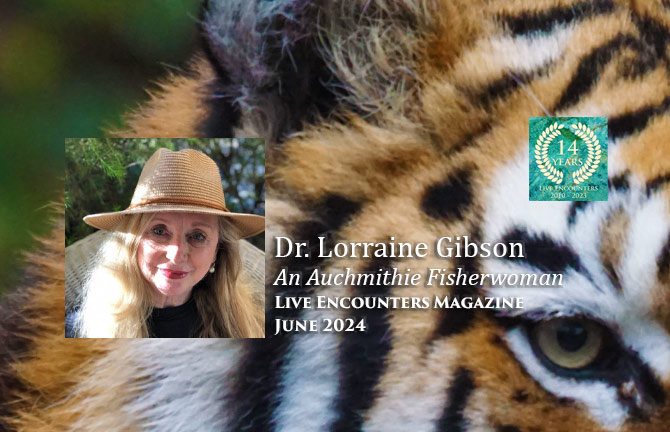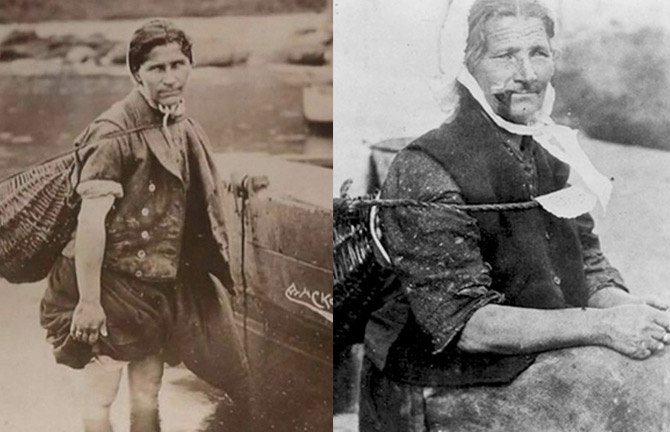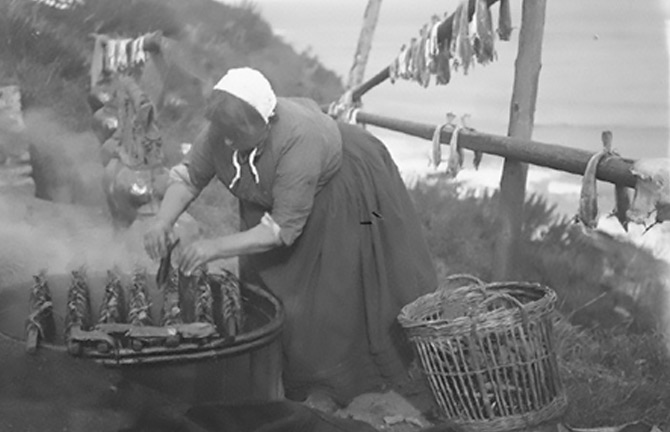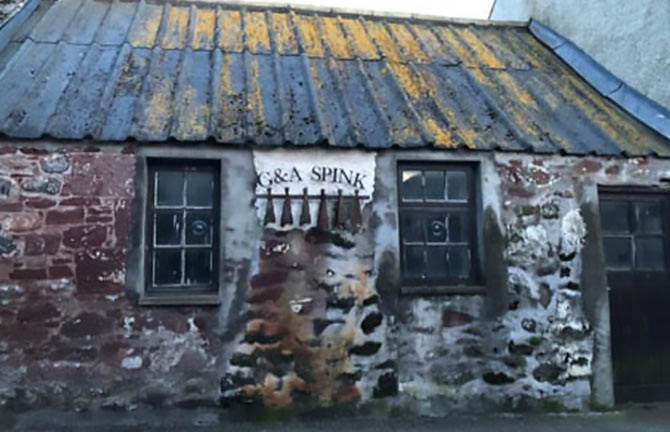
Live Encounters Magazine June 2024
Coffee Bets: An Auchmithie Fisherwoman by Dr Lorraine Gibson.

Photographs courtesy of Darlene Spink and Gordon Findlay. Photographs are in the public domain.
A short story of historical fiction in relation to Elizabeth Cargill (Coffee Bets, 1830-1906) who lived and died in the village of Auchmithie, Scotland. Historical fiction is based on real-life characters in history, with the addition of imagined actions and events.
The coconut scent of wild gorse came in waves; their pea-shaped flowers crowned the earth in a halo of bright gold, lighting the hills as far as the smuggler’s caves at Red Head. You could smell the turn in the weather. The old Cailleach, her teeth like rusty pegs and hair of frosty white would soon be chased away by Brighde. The snowdrops and primrose were awakening, and white-throated linty fledgelings were calling for life from their hedgerow nests.
Elizabeth Cargill kilted her long woollen skirts about her thighs, bent her knees, braced her muckle back against the dark wood hull of the McKorn and heaved. She and her fellow fisher-wives and lasses dug their heels into the shingle and the boat rasped its way across the pebbly beach to meet the white frill of water’s edge.
Her husband Thomas Cargill, dressed for sea in his greasy, blue wool gansie stood waiting. “Up you come Tam”. Elizabeth hoisted her husband onto her back, wrapped his sturdy legs around the girth of her hips, and waded barefoot into the bitter-cold of the North Sea. “Yur gettin’ heavier by the year. Nae mare tatties for you” she laughed, as she ferried her male cargo, dry and warm for now, to the waiting boat. Next, she lowered her lad James in with the other husbands, sons, and brothers. It was time to catch the sweet whitefish.
Elizabeth adjusted the cotton ties on her white bonnet and stretched her back. Standing knee-deep in the wash of the oars, her shadow lengthened and formed a rippling watery twin, backlit by the last lemony light of dusk. She peered as far as she could into the darkening navy sea until the night closed around the shapes and voices of the departing men.
For forty-four winters Elizabeth had followed the well kent patterns of Auchmithie fisherfolk. She had listened to the echoes of centuries, from atop the rugged cliffs on Scotland’s east coast. For as long as memory could fathom, her kinfolk had heeded the call of the sea: this capricious mistress called to their bellies—called to the dwindling coin in the women’s purses. All too often, it called to the men and kept them for its own. Six Spink’s and two Cargill’s swallowed by the sea within the space of ten years. And then there was poor David Spink’s wife, left a widow with six bairns to feed, the youngest not yet one month old.
The villagers knew the men had done the right thing for the boat: some might call it superstition, but she knew no-one had taken any treacherous pig meat to eat onboard, and no unearthly pigeon had come to the men while at sea. “Och, God help us all” she thought. Sometimes it was beyond acceptance that the Lord giveth and the Lord taketh away.
As a young lass Elizabeth had been given her bye, the name she would be known by. Nicknames like ‘Tammie tak-your time’, ‘Dainty Davie’, and ‘Laughing Pete’, were a necessity in a village where names, both first and last, wore the repetition of generations. Elizabeth’s bye was Coffee Bets. Her deep-set eyes were palest aquamarine, fitting for a woman of the water; they shone as lights from a strong-boned face the colour of dark coffee. Her hair, parted in the centre, was caught in a loose bun at the nape: once black as black—it no longer held the sheen of winter’s raven. But for all that she was still a striking looking woman. Outsiders remarked on her dignity and poise, a trait that set her out from many of the fisherwomen.
As Bets turned from shore to home, she prayed for a good slack tide for the men to shoot and haul the lines. All day and every day she bent her body to survival: mussel shelling before dawn, baiting and spreading the lines over flattened dune grass, then skilfully laying the dressed lines in sculls—safeguard for a tangle free flow. Picking up a jasper pebble she rolled her thumb over its smooth green, sea-washed surface. Beauty could be found in this hard way of life—peace of a kind in the rhythms of her known world. She lit her clay pipe, clamped her teeth on the stem, and setting her eyes up the steep brae started out towards cottage and sky. Pleiades promised a clear night.
As she leaned into the slope towards her waiting daughters she chanced a memory. As a young lass she’d wed Thomas Spink. Wedding party honours had fallen, as tradition dictated, to the oldest woman in the village. The oldest wifie had danced out in front, her striped skirts swirling as she led them the three miles to St Vigean’s kirk. Bets smiled as she remembered the old wifie stopping from time to time to sip from her whisky glass as the crowd clapped and sang. Och, but those days had long since passed. No point daydreaming about what ifs or what might have been.
But the mind has its own way of working, and against her wishes, she found herself wondering if any of the other wives had imagined marrying a different man: did they ever think of bringing the thighs of a man other than their husband around their hips as they waded to the boats. There were some braw looking men in Auchmithie and she had not been short of suitors. “Stop your nonsense”, she said out loud, chiding herself for such fancies, glad the blushes could not be seen on her dark skin. What she needed was some scran and bed. Memories and worries would have to bide their time.
Bets birthed Mary her first-born in 1855. By 1872 Jessie, Elizabeth, James, Isabella, and Barbara had followed. Six living bairns in all—five lassies and a lad. Aye, she was a lucky woman. She trusted they would keep the way of the fish, expected they would they wear the clothes and speak the dialect that marked them out as Auchmithie fisherfolk. She dearly hoped they would not wear the scorn of outsiders; those who mocked the women lifting their skirts to carry their men to the boats; those who looked down on their cloistered way of life. People feared difference, that much she knew.
She rose while the moon had not yet welcomed dawn. A thick white haar lay over the water like a ghostly blanket. She sang out to her second eldest to come and look. “Is that not a strange sight Jessie”? True winter was just one month gone and it seemed too early for a true sea fog. “Och Ma, you’re aye that superstitious. It’s not an omen, it’s just a bit warmer this year than last”.
Bets tried to close her ears, to shut out the voice of her mother Jane and the tales of strange happenings on the water: she allowed herself to be convinced that all was right with the world and set about her chores. Scooping handfuls of hardwood sawdust into the kail pot she set that at the bottom of the old whisky barrel. Tam had sunk the old barrel, with its top and base removed, a full foot into the earth. Neither fish nor barrel would feel the might of fierce coast winds. She set the kail pot smoking, blathered about this and that with the other women, her ears attuned to the sound of returning oars.

(Photographer unknown)
The chill morning air filled with the rich scent of history. The women breathed the weel-kent smell of smoking oakwood. Bets readied the fish, gutting, salting, and drying them, then tying each fish tail-to-tail with lengths of jute twine. She hung the paired fish over the smoking barrel on hardwood sticks, layering dampened sackcloth over the top to tamp any unwanted flame. She would tend the fish until the skin crisped and thickened to a deep coppery bronze.
By daybreak the returning boats touched the shoreline. The fisher-lasses and wives took their turns up and down the brae, some carting close to 50lbs of catch. They ferried the drookit men from boat to shore, then packed the creels with fish, and walked the twenty miles to Dundee to sell the fresh haddock and smokies for shillings.
Bets knew her way of life was changing. When she was not quite thirty winters, one hundred-and twenty-three Cargills’ had risen and slept in Auchmithie. The other two-hundred-and-fifty-two living souls in the village had mostly been Spinks’, Swans’, Swankies’, and a few Smiths’ and Beatties’. But the young ones were leaving, lured the three short miles south to the stone harbour of Arbroath; a town with trade a’plenty and no steep brae to climb.
Her descendants had tried to leave before. The whole village and beyond knew the story of her Cargill forebears being enticed in 1705 to the easier fishing in Arbroath. This was when the Auchmithie families were under bondage to the Ethie Estate and the Earl of Northesk. Bets had sat round the peat hearth as a wee lassie listening to her father John tell the story of how the Earl, angry at the Cargill’s leaving, had protested to the Lord Advocate Sir James Stewart, of how the Earl had challenged the freedom of his vassals and won his case to have the families returned. Power always sided with power and money always went to money.
Since 1799 the fisher-folk had been free of their bondage. Now, all that stopped folks from leaving was their own will and the want of change. Indeed, the year before she had been born some of her own kin had begun to lay down roots at the fit o’ the toon in Arbroath, taking with them the ways of the smokie. Only God himself knew if the exodus would continue.
Bets heart failed as the wheel of the twentieth century had barely turned. She had seen beyond the bible’s three score years and ten. She had seen the birth of the ‘Arbroath smokie’. She would not live to see her plentiful descendants cast their nets into the twenty-first century. She would not hear, how her three times great-grand-niece Darlene would speak so proudly of her, and how she wished she had listened more closely to the stories told to her by grandparents and great-grandparents.
She could not have known that the smokie would gain protection like a fine French champagne. Nor could she have imagined Arbroath smokies flying over oceans to kitchens of Red Lichtie expats and Michelin starred chefs. Let us raise our glass to Coffee Bets, to the strong, unsung fish-wives and lasses of Auchmithie, each of whom could rightly say, ‘Wha’s like us? Gey few an’ they’re a’ deid’.

Glossary
Cailleach – a figure in Scottish mythology associated with the bringing of winter, in particular, the raising of wild weather such as storms and strong winds. The old Cailleach is depicted as an old woman or old hag.
Brighde’s – a Celtic goddess known in Scotland as being associated with the bringing of spring and summer. She is considered by some to be a mirror deity to the old Cailleach.
Muckle – strong.
Linty – linnet (bird).
Gansie – water resistant thick wool jersey.
Bye – nickname. The name a person is known by.
Scull – a large, oval shaped wicker basket with a shallow scooped appearance.
Brae – a steep slope.
Bairn – a young infant or child.
Scran – food.
Bide – have patience, pass time.
Haar – thick white sea fret/fog that rolls in from the water.
Kail Pot – metal pot.
Blethered – gossiped, chatted.
Well Kent – well known, well understood.
Drookit – very wet.
Creel – a deep, often crescent shaped, high-sided wicker basket carried on the back and held by a woven strap that stretched around the front and above the breast.
Fit’ o’ the Toon – foot of the town.
Arbroath Smokie – haddock (fish) smoked whole (in the round).
Red Lichtie – a person from Arbroath.
Wha’s like us? – Who is like us?
Guy few an’ they’re a’ deid – Very few and they are all dead.
Many thanks to the people, websites, historians, and friends on social media, who have been so very helpful in providing and sharing information (and photographs) in relation to Elizabeth Cargill (Coffee Bets) and fishing life in Auchmithie. Special thanks go to the relatives and descendants of Elizabeth Cargill who were so willing to share the history of their ancestor. In particular: Kev Cargill of Arbroath; Darlene Spink, born in Auchmithie, three times great-grand-niece of Elizabeth Cargill. Darlene now lives in Arbroath; Kev Spink, previously of Montrose, Scotland with strong familial links to Arbroath. Kev now lives in Queensland, Australia; Gordon Findlay, social historian and genealogist whose mother’s family were fishers in Auchmithie and Arbroath. Gordon now lives in New Zealand.
Social Media
Facebook members of Red Lichties Wordwide, Arbroath, Angus.
Contributors to: https://www.Silander.Scot/auchmithiefamilies
Contributors to: https.//www.Tapatalk.com/groups/auchmithieroots
References
Aberdeen Journal. December, 12.1860.
Hay, E. R. and Bruce Walker., 1985. ‘Focus on Fishing: Arbroath and Gourdon’,
in Abertay Historical Society, (Publication Number 23), Dundee.
McBain, J. M., ‘Arbroath: Past and Present’. Arbroath, 1887.
McBain, J. M., ‘Eminent Arbroathians’. Arbroath, 1897.
© Lorraine Gibson
Dr. Lorraine Gibson, writer, and poet, was born in Glasgow. She is Scottish-Australian. Her poetry appears/is upcoming in journals, magazines, and anthologies in Australia, NZ, US, Canada, and Ireland. These include: Meniscus Literary Journal, Antipodes, Prole, Quadrant, The Galway Review, London Grip, The Lake, Hecate, Backstory, Eureka Street, Live Encounters, Brushstrokes IV, and Poetry for the Planet. Her poetry was shortlisted for the 2023 Calanthe Open Poetry Prize. Lorraine began writing poetry following a career as a Social Anthropologist. She is the author of ‘We Don’t Do Dots: Art and Culture in Wilcannia, New South Wales’, Sean Kingston Publishing:UK.

